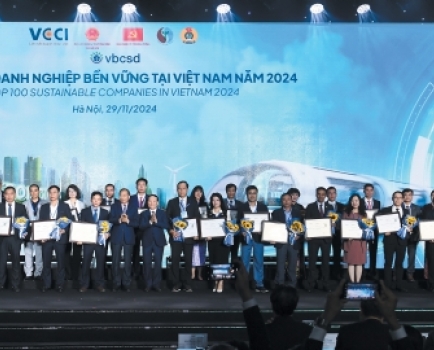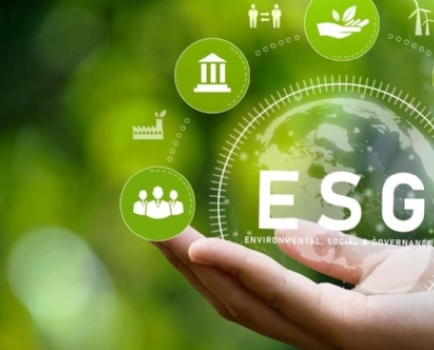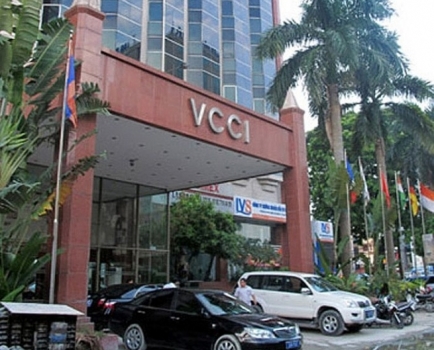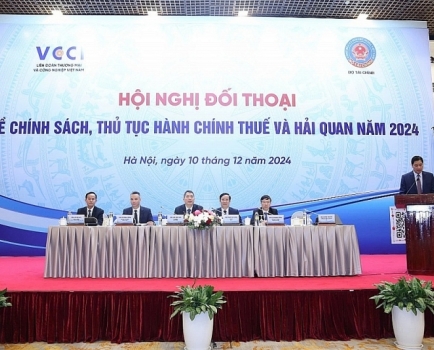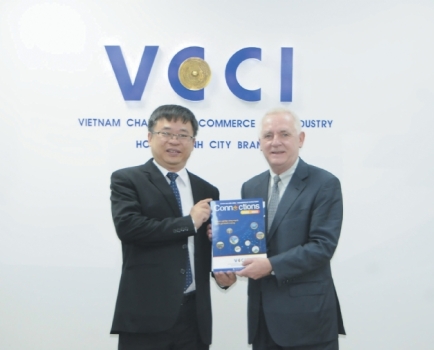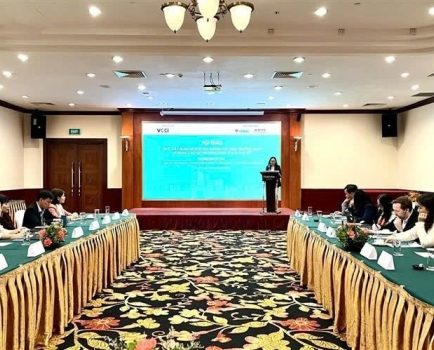Promoting Green Transition in Production, Consumption, and Disposal
Tue, 30 Jul 2024 13:24:00 | Print | Email Share:
Women-owned businesses face significant opportunities and challenges in the green transition across three stages: production, consumption and waste treatment. As global green transition gains momentum, small and medium-sized enterprises (SMEs) must actively participate. Given the Earth's finite resources, adapting economic models and promoting business-driven green initiatives, particularly among SMEs, is essential for sustainable development.

Delegates at the workshop “Green transition: the role of women and women-led enterprises”
Specific economic, environmental and social monitoring and assessment indicators needed
Ms. Mai Thi Dieu Huyen, Vice President of the Vietnam Women Entrepreneurs Council (VWEC) said green transition is no longer merely a trend; it is now acknowledged as a vital imperative for countries aspiring to thrive in the global arena. In tandem with government initiatives such as the National Strategy on Climate Change up to 2050 and the National Strategy on Green Growth for the 2021-2030 period with a vision to 2050, the Vietnamese business community is proactively seeking knowledge and resources to progressively shift their production models towards sustainability and environmental stewardship.
Dr. Nguyen Sy Linh from the Institute of Strategy and Policy on Natural Resources and Environment (ISPONRE) said that SMEs account for more than 95% of all companies in Vietnam and contribute about 45% to the country's GDP. Green transition is both a challenge and an opportunity for Vietnamese companies. Currently, Vietnam does not really have a specific policy on green transition but it is integrated into climate change policies or equitable energy transition.
Green transition only brings about impact when it is applied on a large scale, inclusively and systematically to see its benefits clearly, in which the public sector (green public procurement) needs to create momentum for the private sector to take part, he said. Green transition is both a process and a goal. Therefore, it is essential to regularly assess and monitor to make necessary and timely adjustments. Green transition goals must be applied in production, consumption and disposal. And to achieve inclusiveness and fairness goals in green transition, there must be specific monitoring and evaluation indicators for aspects such as economy, environment and society.
To drive green transition in Vietnam and achieve emissions reduction goals, comprehensive action across four key areas is essential. First, the government must commit to and actively engage in developing, implementing, and monitoring transformation initiatives, particularly in energy. Second, adequate allocation and management of resources and budgets are crucial for realizing transformation objectives, such as advancing renewable energy, fostering green jobs, deploying low-carbon technologies, and promoting green businesses and products. Third, fostering broad participation and cooperation among various stakeholders is imperative to advance transition efforts across economic, social, and environmental dimensions. Lastly, ensuring diverse livelihoods and economic activities are essential for accommodating and supporting groups directly impacted by energy transition, such as transitioning from thermal power to wind and solar energy sources.
The leadership of businesses must change their awareness, Huyen said. Then, they gradually apply “green transition” in production and business such as investing in new machinery, equipment and technology to reduce energy consumption, changing production and operation processes, complying with commitments on sustainable development and green growth, she added.

Ms. Mai Thi Dieu Huyen, Vice President of the Vietnam Women Entrepreneurs Council (VWEC), addresses workshop “Green transition: the role of women and women-led enterprises”
Empowering women-owned businesses
To realize gender equality in general and support female businessowners on the green transition journey in particular, a comprehensive strategy with a long-term roadmap and multi-dimensional activities is needed, said Ms. Tran Thi Thu Thuy, Director of Customer Experiences at VPS Securities Joint Stock Company.
Particularly, four “handovers” have been allocated and implemented by businesses. Empowerment: Encourage and support women entrepreneurs to take on leadership roles in the business community, foster gender balance in management and executive positions. Opportunity sharing: Increase support for startups and develop women-owned businesses, provide consulting and financial support programs to help women entrepreneurs access investment capital and new market opportunities.
Knowledge sharing: Provide training and mentoring programs to equip female entrepreneurs with necessary knowledge and skills in sustainable business management and development, thereby helping them seize opportunities and overcome challenges. Environmental sharing: Build an equal and friendly business environment, create a network of connections between female business owners to share, support and develop.
Currently, the Vietnam Women Entrepreneurs Council (VWEC) under VCCI in coordination with the United Nations Environment Program (UNEP) is carrying out the “Empower: Enhancing women's economic empowerment through green transition” Project aimed at promoting gender equality towards sustainable development and supporting women-led and startup businesses to enhance their resilience to climate change impacts. According to Ms. Parimita Mohanty, Management Officer of Renewable Energy Program, Finance Division, Climate Change Board, UNEP Regional Office for Asia and the Pacific, instead of providing direct support, the project indirectly supports women-owned businesses by working with financial institutions and banks to support access to preferential loans and guaranteed supports. The project even connects investors to businesses, including training for businesses to negotiate and exchange with investors.
Mr. Tran Thanh Nam, Head of Non Concentrated Credit Department, Vietnam Environment Protection Fund (VEPF)said, VEPF currently has a lending mechanism for institutional and individual investors of environmental protection projects. They are accessible to preferential loans with an interest rate of 2.6% per annum or 3.6% per annum (fixed interest rate throughout the loan period) with a loan term of up to 10 years and a grace period of up to two years. The loan value is up to 70% of the total project investment capped at VND36.6 billion for a project and VND73.2 billion for an investor. In the coming time, the loan amount for an investor can be up to 10% of the fund's actual registered capital at the time of loan granting (or VND120 billion). This can be a reasonable source of credit for many female enterprises that need money for green development.
By: Lan Anh, Vietnam Business Forum
Source: https://vccinews.com/news/57151/promoting-green-transition-in-production-consumption-and-disposal.html
---------------------------------------------
Same category News :



